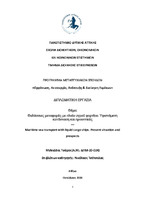| dc.contributor.advisor | Tsotsolas, Nikos | |
| dc.contributor.author | Τσάρος, Μιλτιάδης | |
| dc.date.accessioned | 2024-05-13T10:12:00Z | |
| dc.date.available | 2024-05-13T10:12:00Z | |
| dc.date.issued | 2023-10-26 | |
| dc.identifier.uri | https://polynoe.lib.uniwa.gr/xmlui/handle/11400/6698 | |
| dc.identifier.uri | http://dx.doi.org/10.26265/polynoe-6534 | |
| dc.description.abstract | Ιστορικό: Οι θαλάσσιες μεταφορές αποτελούν τη ραχοκοκαλιά του διεθνούς εμπορίου και της παγκόσμιας οικονομίας. Πάνω από το 80% του όγκου του διεθνούς εμπορίου αγαθών μεταφέρεται δια θαλάσσης και το ποσοστό είναι ακόμη υψηλότερο για τις περισσότερες αναπτυσσόμενες χώρες. ;Όμως η ναυτιλιακή ζήτηση έχει συρρικνωθεί απότομα και -παρά τη μικρή βραχυπρόθεσμη ανάκαμψη- αναμένεται να παραμείνει σε χαμηλό επίπεδο μεσοπρόθεσμα και στη συνέχεια να μειωθεί περαιτέρω μετά το 2032 ως αποτέλεσμα της ενεργειακής μετάβασης. Σκοπός: Η συλλογή δεδομένων για την πορεία των θαλάσσιων μεταφορών και με πλοία
υγρού φορτίου , καθώς το πετρέλαιο και οι θαλάσσιες μεταφορές αποτελούνε από κινητήριος δύναμη όχι μόνο του εμπορίου αλλά και του ΑΕΠ πολλών χωρών. Αποτελέσματα: Από την μία πλευρά υπάρχει συρρίκνωση της ζήτησης υγρού φορτίου αλλά από την
άλλη λόγω παλαιότητας υπάρχει αύξηση παραγγελιών πλοίων. Συμπεράσματα: Η μείωση της ζήτησης υγρών καυσίμων βρήκε ισορροπία με τα funds που βρήκανε ευκαιρία να επενδύσουν σε πετρέλαιο. Έτσι πολλοί εφοπλιστές νοίκιασαν τεράστια
αλλά και μικρά δεξαμενόπλοια όπου αποθήκευσαν υγρά καύσιμα τα οποία αγόρασαν σε χαμηλές τιμές, και περιμένουν την κατάλληλη εποχή να τα ρίξουν στο χρηματιστήριο για να κερδίσουν. | el |
| dc.format.extent | 137 | el |
| dc.language.iso | el | el |
| dc.publisher | Πανεπιστήμιο Δυτικής Αττικής | el |
| dc.rights | Αναφορά Δημιουργού - Μη Εμπορική Χρήση - Παρόμοια Διανομή 4.0 Διεθνές | * |
| dc.rights | Αναφορά Δημιουργού 4.0 Διεθνές | * |
| dc.rights.uri | http://creativecommons.org/licenses/by/4.0/ | * |
| dc.subject | Θαλάσσιες μεταφορές | el |
| dc.subject | Υγρό φορτίο | el |
| dc.subject | Δεξαμενόπλοιο | el |
| dc.subject | Μελλοντικές προκλήσεις | el |
| dc.subject | Περιβάλλον | el |
| dc.subject | Είδη δεξαμενόπλοιων | el |
| dc.subject | Maritime transport | el |
| dc.subject | Χύδην φορτίο | el |
| dc.title | Θαλάσσιες μεταφορές με πλοία υγρού φορτίου. Υφιστάμενη κατάσταση και προοπτικές | el |
| dc.title.alternative | Maritime sea transport with liquid cargo ships. Present situation and prospects | el |
| dc.type | Μεταπτυχιακή διπλωματική εργασία | el |
| dc.contributor.committee | Κομισόπουλος, Φαίδων | |
| dc.contributor.committee | Kargas, Antonios | |
| dc.contributor.faculty | Σχολή Διοικητικών, Οικονομικών & Κοινωνικών Επιστημών | el |
| dc.contributor.department | Τμήμα Διοίκησης Επιχειρήσεων | el |
| dc.contributor.master | Οργάνωση, Λειτουργία, Ανάπτυξη, Διοίκηση Λιμένων | el |
| dc.description.abstracttranslated | History: Maritime transport is the backbone of international trade and the global economy. More than 80% of the volume of international trade in goods is transported by sea, and the proportion is even higher for most developing countries. ; But shipping demand has contracted sharply and – despite a small short-term recovery – is expected to remain low over the medium term and then decline further after 2032 as a result of the energy transition. Purpose: The collection of data on the course of maritime transport also with liquid cargo ships, as oil and maritime transport are a driving force not only of trade but also of the GDP
of many countries. Results: On the one hand there is a contraction in demand for liquid cargo, but on the other hand, due to age, there is an increase in ship orders. Conclusions: The decline in demand for liquid fuels found a balance with funds that found an
opportunity to invest in oil. So many shipowners rented huge and small tankers where they stored liquid fuels which they bought at low prices, and are waiting for the right time to throw them on the stock market to make a profit. | el |


